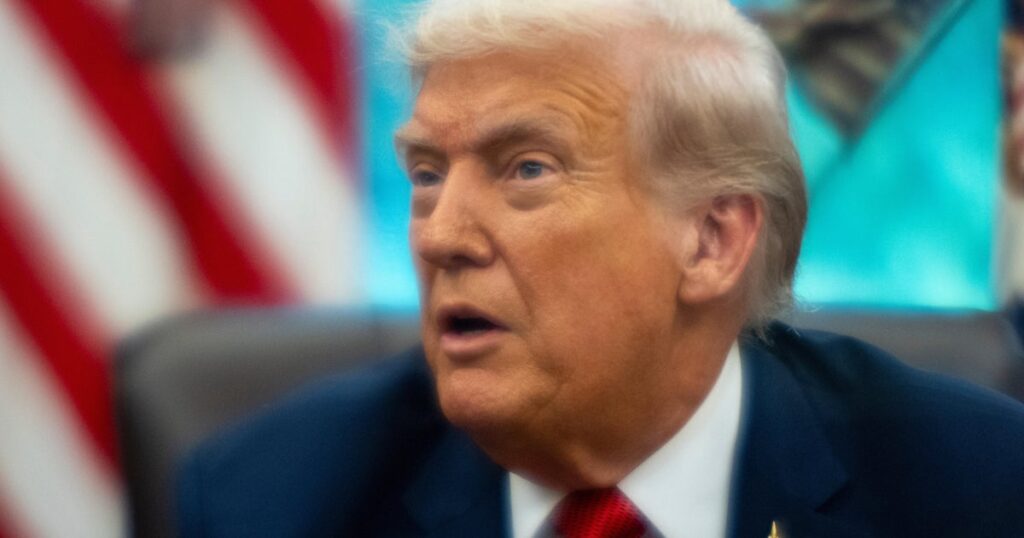In a significant statement regarding the Israeli-Palestinian conflict, the U.S. President has firmly opposed the idea of annexing the occupied West Bank, a proposal gaining traction among some members of Israeli Prime Minister Benjamin Netanyahu‘s cabinet. During a recent event in the Oval Office, the President asserted his commitment to prevent any territorial annexation, emphasizing the need for diplomatic restraint at a time when international recognition of Palestinian statehood is mounting. The backdrop to these comments includes escalating tensions in the region, particularly amid the ongoing conflict in Gaza.
| Article Subheadings |
|---|
| 1) U.S. Stance on West Bank Annexation |
| 2) Background of the West Bank Situation |
| 3) International Reactions to Annexation Proposals |
| 4) Impact of the Gaza Conflict |
| 5) Moving Forward: Ceasefire Efforts |
U.S. Stance on West Bank Annexation
The President’s comments came during a press event where he stated,
“I will not allow Israel to annex the West Bank. There’s been enough. It’s time to stop now.”
This statement is pivotal as it signals a clear intention from the U.S. to maintain a stance against unilateral actions that could impede the peace process. This response surfaces against a backdrop of increasing calls within Israel for the government to annex territories in the West Bank, especially among hardline factions. The timing of this declaration coincides with reports that the President assured leaders of Arab nations that he would oppose any moves towards annexation, further complicating the geopolitical landscape of the region.
Background of the West Bank Situation
The West Bank has been under Israeli occupation since 1967 and is characterized by a demographic tapestry of millions of Palestinians alongside Israeli settlers. The territory is divided into areas of varying degrees of Israeli and Palestinian control, established through previous agreements. The region has seen multiple proposals for forming a Palestinian state, yet these typically trade significant land control back to the Palestinians. This struggle for territorial control has historical roots and contemporary ramifications for peace negotiations. If Israel were to formally annex the West Bank, it would jeopardize the feasibility of a future Palestinian state, raising tensions not only locally but also among the international community that has shown increasing support for Palestinian self-determination.
International Reactions to Annexation Proposals
In recent days, several Western nations, including France, the United Kingdom, and Canada, have made significant strides toward recognizing a Palestinian state. This shift has provoked responses from Israeli officials, with Netanyahu expressing his government’s resolve to react to perceived threats of recognition. While the exact implications of international recognition remain contentious, it underscores a growing consensus among certain nations regarding Palestinian rights. Furthermore, this reaction is compounded by the urgent international outcry regarding Israel’s handling of the ongoing Gaza crisis, which places the annexation debate within a context of humanitarian concerns and international law.
Impact of the Gaza Conflict
The current conflict in Gaza has deeply affected efforts towards peace and stability in the region. Beginning with a Hamas-led attack that resulted in the deaths of approximately 1,200 individuals, the ensuing violence has decimated infrastructure across the Gaza Strip. With the Gaza Health Ministry reporting the toll of over 60,000 casualties, questions arise regarding the humanitarian implications for Palestinians in both Gaza and the West Bank. The parallel developments of increased military action and territorial ambitions only exacerbate an already tense situation. Global leaders, including the U.S. President, have sought to mediate ceasefire agreements, hoping to unlock pathways for negotiations while simultaneously addressing the urgent needs of civilians caught in the conflict.
Moving Forward: Ceasefire Efforts
In light of the ongoing violence, there have been persistent calls for a ceasefire between Israel and Hamas. The President has pressed both parties to consider a ceasefire deal that could lead to the release of remaining Israeli hostages. However, consensus on terms has remained elusive, complicating humanitarian efforts and influencing political dynamics in the region. The ramifications of prolonging violence extend beyond immediate casualties, affecting diplomatic relations, economic stability, and security in surrounding nations. Therefore, initiatives to foster dialogue and encourage negotiation are critical in steering the situation towards a peaceful resolution, particularly amid the backdrop of heightened tensions over the West Bank’s future.
| No. | Key Points |
|---|---|
| 1 | The U.S. President opposes Israeli annexation of the West Bank. |
| 2 | The West Bank has been occupied by Israel since 1967, complicating peace efforts. |
| 3 | International recognition of a Palestinian state is increasing among Western nations. |
| 4 | The humanitarian impact of the Gaza conflict is severe, with thousands of casualties reported. |
| 5 | Efforts for a ceasefire are ongoing but remain complex and challenging. |
Summary
The U.S. stance against the annexation of the West Bank underscores a critical juncture in the Israeli-Palestinian conflict. As international recognition of Palestinian self-determination grows, the backdrop of the Gaza crisis introduces further challenges. Realizing peace will require nuanced discussions that address the humanitarian needs and political realities on the ground. The ongoing diplomatic efforts, including attempts at a ceasefire, emphasize the necessity for cooperative dialogue and a commitment to sustainable solutions in the region.
Frequently Asked Questions
Question: What are the implications of U.S. opposition to Israeli annexation?
U.S. opposition may serve to deter Israel from unilateral moves that could undermine peace negotiations. It signifies a push for collaborative approaches to address the complexities of the Israeli-Palestinian conflict.
Question: Why is the West Bank a focal point in Israeli-Palestinian discussions?
The West Bank is central to the peace process, with competing claims over territory influencing prospects for a two-state solution. Control and autonomy in the region remain critical issues.
Question: How has the Gaza conflict affected the international community’s view of Israel?
The Gaza conflict has heightened scrutiny of Israeli policies and actions, pushing many nations to reconsider their diplomatic relationships. Concerns over humanitarian conditions have intensified calls for accountability and a peaceful resolution.
